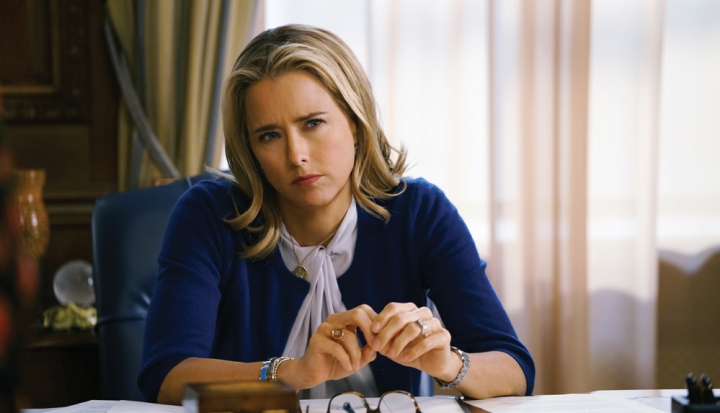Madam Secretary (CBS, in its third season) breaks bold new ground in media portrayals of women leaders: Secretary of State Elizabeth McCord’s friends, family, colleagues, and even the President of the United States treat her as if, in fact, she can lead.
On television and in film, when women are running corporations or countries, they are often portrayed in ways that reinforce tired stereotypes and fears about female leadership. Women in power are cast as unnatural, devious villains (Glenn Close’s Patty Hewes in Damages) or unnatural, icy machines (Robin Wright’s Claire Underwood in House of Cards) or unnatural, brittle witches (Meryl Streep’s Miranda Priestly in The Devil Wears Prada).
Unnatural is the key word. The ability to command authority—and other people—is typically treated in media as something outside of the female experience.
To lead, we’re told, female characters must abandon themselves as women, eschew friendship and love, and become humorless machines who live in uncomfortably tight skirts and painfully high heels (even when home feeding their cats). When shown with children, they are inept and clumsy. When shown with men, they are rapacious or bored. They treat colleagues and coworkers as competitors and employ unreasonable and inefficient management techniques, like murder and blackmail. This is a woman’s choice, at least in the media’s usual ham-fisted interpretation of human relationships: Professional achievement requires reversing the “natural” feminine attributes of nurturance and caretaking, adopting a frozen exterior, and skirting perilously close to being a sociopath.
Enter Elizabeth McCord (Téa Leoni), whom we meet while she is cannily unmasking a student’s excuses about an assignment. She leaves the young man’s dignity intact, but her high expectations for his performance are unequivocal. Later, while she is mucking out a stall and wearing messy braids (no high heels in a horse barn), the president arrives in a motorcade. They worked together at the CIA, where he admired her ethics, original thinking, and patriotic scruples, and he now wants her as Secretary of State.
McCord manages her staff, her boss’ expectations, and her peers from around the world with a lively mix of intelligence, wit, humanity, and charm. Oh, and she is utterly capable of the job. She believes in the agency and ability of the people she helps govern. She wrestles with recalcitrant ambassadors with compassion and firmness. She is facile with Middle Eastern history and customs and speaks several languages. She Skypes with world leaders, treats people of all backgrounds with respect, and is simultaneously eloquent and down-to-earth. She deals with a Cabinet of mostly men, some of whom can be patronizing.
Wonderfully, Madam Secretary does not lean on the weary plot device of men being annoyed at finding women in the workplace, as if misogyny was news. It may be to some men, but it’s a fact of life to women, who every day must find ways over, under, around, or through persistent sexism. Patriarchy is entrenched and commonly encountered by most women in almost every area of life. To treat patriarchy as if it is an aberrant occurrence that can be overcome by simply proving your worth in the workplace minimizes its insidious effects on the everyday lives of men and women. Patriarchy is far more prevalent and complex than that.
The most interesting thing about being Secretary of State is not getting a boy down the hall to like you. McCord grapples with demanding and oppositional agendas of nations small and large—which include the very real kinds of sexism that get women harmed and killed—in one of the most intriguing jobs on the planet. By taking that position, Madam Secretary helps patriarchy matter just a little less.
Madam Secretary also avoids clichéd family plot lines. Media children of strong women are often portrayed as bratty and pouty, acting out because if mom is out there in the world, surely she is failing significantly at home. But McCord is warm, loving, and deeply engaged with her three children, who are not drawn as sickeningly cutesy, idiotic teens or charmless snarks. Her son is an anarchist, and his parents give him room for his views and opinions; one daughter leaves college before graduating, but her life is not ruined, and she begins to find her own way; and the other is a fashion maven who wants to be a stylist to the stars. They are proud of their mother, as they should be.
Media husbands often act emasculated by their wife carrying a briefcase, can’t change a diaper or cook mac and cheese, and are plunged into depressed loneliness if left alone for an evening. Not Elizabeth McCord’s husband. Henry McCord (Tim Daly) tosses the parenting ball back and forth with his wife with competence and good humor. In a bustling family kitchen one morning, he reminds his three children that their mother has to get out the door to “go save the world.” He delivers this line with no rancor, jealousy, or sarcasm. That’s actually her job, and he gets out of her way so she can go do it.
Travel and work demands do strain their time together, and they do experience conflict, but they talk about it intelligently and respectfully. They praise each other in public and in private, and they truly like and admire each other. They flirt, laugh, tease, and annoy each other. They appear functional. This is so uncommon among media marriages that it is striking.
Media stories aren’t reality, but they are the narratives that we insist on telling ourselves. Finally, we have begun to tell ourselves that 50 percent of the world can lead at the office, too. High time. Madam Secretary is smart, funny, instructive, and telling. Brava.
This article also appears in the June 2017 issue of U.S. Catholic (Vol. 82, No. 6, pages 38–39).
Image: Courtesy of CBS Entertainment














Add comment